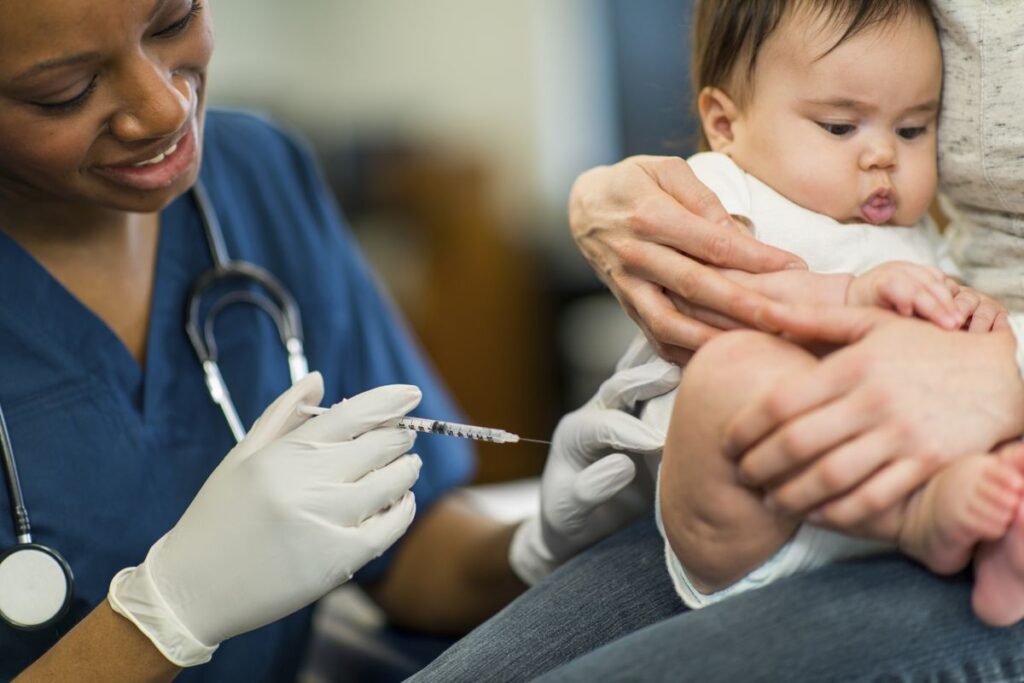Pneumonia, an infection that inflames the air sacs in one or both lungs, is a serious health concern, especially for vulnerable populations like young children, the elderly, and those with weakened immune systems. While antibiotics have long been the cornerstone of treatment for bacterial pneumonia, there is another powerful weapon in the fight against this deadly disease: vaccines.
Despite the availability of antibiotics, pneumonia continues to be a leading cause of hospitalization and death worldwide. In fact, according to the World Health Organization (WHO), pneumonia is responsible for more than 2 million deaths annually. This statistic underscores the importance of prevention, as antibiotics alone are not enough to eliminate the burden of this disease. The introduction of vaccines has proven to be an effective and essential tool in pneumonia prevention, reducing both the incidence of the disease and its associated complications.
In this article, we’ll explore the critical role of vaccines in fighting pneumonia, why they are a necessary complement to antibiotics, and how they help save lives by preventing infections in the first place.
The Pneumonia Problem: Why Prevention is Crucial
Pneumonia can be caused by a variety of pathogens, including bacteria, viruses, and fungi, with bacterial pneumonia being the most common form requiring antibiotic treatment. Some of the most common bacteria responsible for pneumonia include Streptococcus pneumoniae, Haemophilus influenzae, and Staphylococcus aureus. Viral pneumonia is often caused by viruses such as the influenza virus, respiratory syncytial virus (RSV), and coronaviruses.
Even with antibiotics, pneumonia remains a significant public health issue. A few reasons for this are:
-
Antibiotic Resistance: Overuse or misuse of antibiotics has led to the emergence of antibiotic-resistant bacteria, making some forms of pneumonia more difficult to treat.
-
Delayed Diagnosis: Pneumonia often shares symptoms with other respiratory illnesses, such as the common cold or flu, leading to delayed diagnosis and treatment.
-
Vulnerable Populations: Elderly individuals, young children, and immunocompromised patients (e.g., those undergoing chemotherapy) are particularly at risk of severe pneumonia and complications.
As a result, prevention strategies, such as vaccination, are more important than ever to reduce the burden of this potentially deadly disease.
The Role of Vaccines in Preventing Pneumonia
Vaccines Protect Against Bacterial Pneumonia
Vaccines are designed to stimulate the body’s immune system to recognize and fight specific pathogens, including the bacteria that cause pneumonia. By priming the immune system in advance, vaccines provide long-lasting protection against infection, reducing the likelihood of developing pneumonia caused by certain bacteria.
Pneumococcal Vaccines
One of the most important vaccines for preventing bacterial pneumonia is the pneumococcal vaccine, which protects against Streptococcus pneumoniae, the most common bacterial cause of pneumonia. There are two main types of pneumococcal vaccines:
-
Pneumococcal conjugate vaccine (PCV13): This vaccine protects against 13 types of pneumococcal bacteria and is recommended for children under the age of 5, as well as adults aged 65 and older.
-
Pneumococcal polysaccharide vaccine (PPSV23): This vaccine protects against 23 types of pneumococcal bacteria and is typically recommended for adults aged 65 and older or those with certain chronic health conditions, such as diabetes, heart disease, or chronic lung disease.
Both vaccines are essential for reducing the incidence of pneumococcal pneumonia, bloodstream infections, and meningitis, particularly in vulnerable populations. Studies have shown that pneumococcal vaccination can reduce pneumonia-related hospitalizations and death rates, making it a cornerstone of pneumonia prevention.
Haemophilus influenzae Type B (Hib) Vaccine
Another important vaccine for preventing bacterial pneumonia is the Haemophilus influenzae type b (Hib) vaccine. Haemophilus influenzae can cause pneumonia, as well as other severe infections such as meningitis and epiglottitis. The Hib vaccine is part of the routine childhood vaccination schedule and has significantly reduced the incidence of Hib-related pneumonia in children.
Vaccines Can Help Prevent Viral Pneumonia
While antibiotics are effective for treating bacterial pneumonia, they are not useful for viral pneumonia. However, several vaccines can help prevent viral infections that can lead to pneumonia.
Influenza Vaccine (Flu Shot)
The influenza vaccine, commonly known as the flu shot, is one of the most important vaccines for preventing viral pneumonia. Influenza (flu) is a highly contagious virus that can cause severe respiratory illness, including pneumonia. The flu vaccine is updated annually to target the strains of the virus that are most likely to be circulating during the upcoming flu season.
By preventing the flu, the influenza vaccine reduces the risk of developing secondary bacterial pneumonia (a common complication of flu) as well as viral pneumonia caused directly by the influenza virus.
Respiratory Syncytial Virus (RSV) Vaccine
Respiratory syncytial virus (RSV) is another major cause of viral pneumonia, particularly in infants and the elderly. RSV causes severe respiratory illness in infants, leading to hospitalizations for pneumonia and bronchiolitis. While there is no approved vaccine for RSV for adults, vaccines are available for high-risk infants. Research is ongoing to develop an RSV vaccine for adults, which would help reduce the burden of RSV-associated pneumonia.
Vaccines Reduce Complications and Hospitalizations
In addition to preventing the onset of pneumonia, vaccines can reduce the severity of the disease and prevent complications. For example, individuals who receive the pneumococcal vaccine and flu vaccine are less likely to experience severe pneumonia complications, including respiratory failure, sepsis, or the need for intensive care.
Additionally, vaccinated individuals are less likely to be hospitalized for pneumonia, reducing healthcare costs and the strain on hospitals, particularly during peak flu seasons.
Community-Wide Protection: Herd Immunity
When a significant portion of the population is vaccinated against pneumonia-causing pathogens, it helps protect those who cannot be vaccinated, such as infants, elderly individuals, and immunocompromised people. This phenomenon is known as herd immunity. By reducing the overall incidence of infection, vaccines indirectly protect those at higher risk who may not have access to or cannot safely receive certain vaccines.
Addressing Antibiotic Resistance
Overuse and misuse of antibiotics have contributed to the global rise in antibiotic resistance, making some bacterial infections harder to treat. By preventing pneumonia through vaccination, fewer people will require antibiotics, which helps slow the spread of antibiotic-resistant bacteria. This is especially important for preventing drug-resistant pneumococcal pneumonia, a growing concern worldwide.
Who Should Get Pneumonia Vaccines?
Children
Vaccination is particularly important for young children, who are at higher risk of developing severe pneumonia. The Hib vaccine, PCV13, and the flu vaccine are recommended for all children as part of their routine immunization schedule.
Older Adults
Older adults are at an increased risk of pneumonia due to the natural decline in immune function with age. The pneumococcal vaccine (both PCV13 and PPSV23) and the flu vaccine are especially important for people over 65 to help prevent pneumonia and its complications.
Individuals with Chronic Health Conditions
People with chronic conditions such as diabetes, heart disease, chronic lung disease, and immunocompromised states (e.g., due to cancer treatments or organ transplants) are more susceptible to severe pneumonia. Vaccines such as the pneumococcal vaccine and flu vaccine can significantly reduce their risk of developing pneumonia.
Pregnant Women
Pregnant women should also get the flu vaccine to protect themselves and their unborn babies from potential complications of pneumonia. The pertussis vaccine (whooping cough) is also recommended during pregnancy to help protect newborns from severe respiratory infections.
Conclusion: Vaccines as a Key Tool in Pneumonia Prevention
While antibiotics remain essential for treating bacterial pneumonia, they are not enough to fully combat the disease. Vaccines are a vital tool in the fight against pneumonia, offering protection not only from bacterial infections but also from viral causes. By preventing pneumonia in the first place, vaccines help reduce the burden on healthcare systems, save lives, and protect the most vulnerable populations.
As pneumonia continues to be a significant global health issue, vaccination remains one of the most effective and cost-efficient strategies for preventing this potentially life-threatening condition. If you are at risk for pneumonia, consult with your healthcare provider about getting vaccinated and protecting yourself and your loved ones from this dangerous disease.






